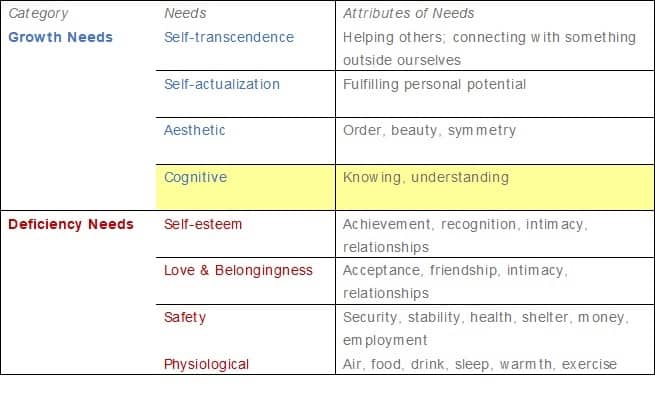Maslow and Cognitive Growth Needs
23 June 2021
This blog marks a jump from Maslow’s deficiency needs (physiological, safety, love & belonging, and self-esteem) to his growth needs: cognitive, aesthetic, self-actualization, and self-transcendence. Maslow’s division of needs into two major parts is interesting in itself. If all that we’ve discussed so far are deficiency needs, what does this tell us?
Maslow maintained that without satisfying the deficiency needs, we interact with the world from a partial void, in constant need of satisfying the psycho-social hunger responsible for that void. In the blog of 9 June 2021, Dick and Jane were introduced and described. Though both characters were over-simplified, Dick was operating from a position in which his deficiency needs had been met, allowing him to move into the satisfaction of growth needs. Jane’s deficiency needs were not adequately met and her inability to function with resilience was preventing her from moving toward self-actualization, a process Maslow felt could not begin until deficiency needs were met.
I am not yet sufficiently knowledgeable about Maslow to know what he was reading when these ideas unfolded but have been curious about the coincidence of Aristotle’s use of the term actualization. Did Maslow find the term in Aristotle’s work?
The development of form, as an organism grows to maturity, is a process internal to the organism itself. But an organism’s internal principle of change is its nature. An object’s nature would thus seem to be a developmental force which impels it toward the realization of its form (Lear, 1988, p. 19, re: Aristotle’s Physics II.2, my bolding).
There are books written on form but today concise wins the race: form, “...the structure or essence of a thing...” (Audi, 1998, p. 271).
How then can Aristotle identify an organism’s nature with its form? The answer...is that form can exist at varying levels of potentiality and actuality. A young organism’s form should not be identified with its current organization and structure (Ibid).
For present purposes, I will, with immense respect to Dr. Lear, amend the last sentence above as follows: “An organism still plagued with deficiency needs should not be identified with its current organization and structure.” This has immense implications for anyone who has suffered developmental, mental health, addictive, traumatic, or concurrent disorders. What Lear is claiming is that Aristotle also believed that our unfolding, as fully actualized humans, can be arrested at any point. As such, a merge of Maslow and Aristotle asks readers to suspend final judgment of a person’s nature, seeking first to understand how fully that person has met her deficiency needs.
Table 1, Maslow’s Hierarchy of Needs (Atkinson and Tomley, 2012)

A configuration that has troubled me for years is the Christian requirement that we be willing to sacrifice for others, regardless of our station in life. How do we expect a person, who is constantly craving external affirmation, meaningful work, stability, and good food, to place others above self? Is this ever a healthy human configuration?
Let’s project Dick and Jane out of the schoolyard and into parenting roles. Dick is pretty much psycho-socially well balanced. He has a wife he loves, kids they choose to bring into being, along with satisfying work and friendships at cognitive levels suitable to Dick’s resources. Jane is different. Jane fell into addictive behaviours in her final year of high school when a boyfriend introduced her to some hallucinogens (mushrooms and mescaline) and before too long, Jane was pregnant, out of home and school, and looking for work to support herself and her baby as a single mother. She is intensely angry because she has fallen into the same trap her mother did—a path Jane swore she would not repeat. Yet she tries to contain that anger, so it won’t spill over onto her young son, John. What she does not realize is that her own resistance to that anger is causing her to depress her feelings of sadness, self-loathing, and disappointment and that resistance is causing her blood pressure to rise, changing her heart rate, her voice, her breathing, and her posture. And young John, though he doesn’t know how or why, picks up on these bodily clues from his mother and begins to close down emotionally.
Given these two contexts, Dick’s and Jane’s, which of these people is ready to enter Maslow’s first growth stage, cognition? While the raw intelligence could easily be available to Jane, the emotional bottleneck she has created prevents her from releasing her anger, coming to terms with her past, and accepting, forgiving, and moving on. When Jane gets a bad test back, she freaks out telling herself she was a fool to try this, that she’s an idiot, and that she’s just embarrassing herself.
Meanwhile, when Dick messed up tests in school, he was surprised and disappointed. But, because Dick thought he was basically a competent person, he would ask a friend or teacher where he had gone wrong in his understanding. And then he’d correct his course of actions.
As these blogs are more exploratory than definitive, the point being made is that the factors, required to enter Maslow’s growth stage, are surprisingly unforgiving. The ability to self-sooth, the ability to feel disappointment but come back with resilience, and the ability to organize one’s time and work have as much to do with scholastic success as intellect, perhaps more. It is for just such reasons that Maslow held that our needs must be met in a sequence predetermined by the very nature or essence (form) of human beings.
Dan Chalykoff is working toward an M.Ed. in Counselling Psychology and accreditation in Professional Addiction Studies. He writes these blogs to increase (and share) his own evolving understandings of ideas. Since 2017, he has facilitated two voluntary weekly group meetings of SMART Recovery.
Comments